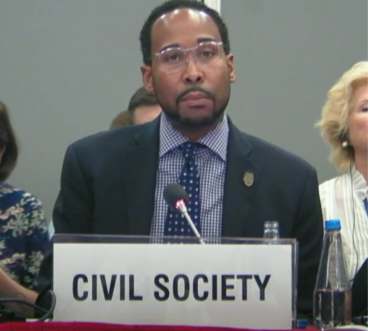By Erika Schlager, Counsel for International Law
and Dr. Mischa Thompson, Senior Policy Advisor
From September 10 to September 21, 2018, the OSCE participating States held their annual Human Dimension Implementation Meeting (HDIM) in Warsaw, Poland. Organized by the OSCE Office for Democratic Institutions and Human Rights (ODIHR), HDIM is Europe’s largest annual human rights conference, bringing together hundreds of government and nongovernmental representatives, international experts, and human rights activists for two weeks to review OSCE human rights commitments and progress. During the 2018 meeting, three specially selected topics were the focus of a full-day discussion: freedom of the media; the rights of migrants; and combating racism, xenophobia, intolerance, and discrimination.
As part of its efforts to fight racism and xenophobia, ODIHR, with U.S. support, organized a workshop for activists addressing racism and xenophobia against people of African descent. During the two-day event, 18 participants of African descent from Europe and North America focused on the OSCE and other international human rights instruments that address discrimination. U.S. participants included Johnetta Elzie, who led calls for justice following the police killings of unarmed African-American men, including in Ferguson and Baltimore, and David Johns, who called for police to address hate crimes targeting transgender African-Americans.
The group discussed efforts by civil society to collect and report hate crimes data to ODIHR, coalition-building among diverse groups, strengthening advocacy in international fora, and building information exchanges in various countries. The discussion also touched on the International Covenant on the Elimination of All Forms of Racial Discrimination and International Decade for People of African Descent (2015-2024).
Activists at the HDIM
On September 20, the HDIM agenda focused specifically on racism, xenophobia, intolerance and discrimination. Workshop participants were invited to join government representatives and NGOs to discuss a broad set of challenges in both formal sessions and during side events.
Canadian NGOs advocated for expunging marijuana drug charges disproportionately impacting Black men as part of legalization efforts in their country. Polish activists reiterated concerns that police are not adequately investigating hate crimes and, in some cases, have arrested undocumented migrants when they came to police to report a hate crime. A Hungarian participant sought support to address negative perceptions of refugees following the adoption of laws imposing criminal penalties on Hungarians who assist asylum seekers. A French participant spoke of discrimination impacting Black Muslims and the need to address racial and religious bias. One participant questioned when a Swedish national plan addressing anti-black racism or “Afrophobia” would be implemented.
A defamation case launched against European Parliamentarian Cecile Kyenge for calling the Italian political party The League “racist” led participants to question how racial prejudice and discrimination could be addressed if activists faced retribution for simply naming the problem. Participants also expressed concern about a forecasted decline in diversity in the European Parliament that will follow a post-BREXIT loss of UK parliamentarians, at a time when political parties espousing “anti-foreigner” views are predicted by some to increase in power.
Several countries responded to issues raised by the participants during the meeting. A representative for Sweden thanked civil society members for participating in HDIM and highlighted the government’s recent increase in funds and national plans to address racism, stating plans to address “Afrophobia are underway.”
A U.S. representative indicated support for civil society participation in the meeting, calling civil society “brave,” and admonished the excessive use of force by law enforcement, particularly when linked when racial discrimination. The representative detailed the legal proceedings taken against the city of Ferguson by the U.S. Department of Justice that have resulted in implicit bias, community policing, mental health sensitivity, and other training to improve relations between police and the African-American community in Ferguson. Canada thanked participants for sharing their experiences and reiterated its commitment to addressing racism and discrimination.
Recommendations from participants in the September 20 session included:
- Increasing the representation of people of African descent in OSCE institutions and leadership positions
- Adopting national action plans to improve the situation of people of African descent, including implementing the International Convention on the Elimination of All Forms of Racial Discrimination and the International Decade for People of African Descent
- Collecting disaggregated data on hate crimes and discrimination in housing, education, employment, and other sectors impacting people of African descent
- Targeting programs for refugees and migrants of African descent, including an increased focus on integration
- Training initiatives to improve police interaction with African descent populations, including migrant and refugee populations
- Increasing support for civil society and work in partnership with civil society





